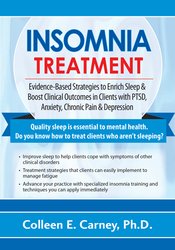

We all know the necessity of sleep –yet we often overlook addressing it in therapy. Your clients with PTSD, anxiety, depression and chronic pain are struggling with symptoms of those disorders, and everything is made worse when they aren’t able to sleep.
If your clients aren’t sleeping, do you know what to do about it?
In this recording, I’ll show you successful, proven techniques I’ve developed over the last decade on how to optimize your clients’ sleep – without medication! You don’t need to be a sleep specialist to implement these strategies in your office.
Discover evidence-based strategies to help your clients increase energy during the day, sleep more deeply and re-initiate sleep after it’s been disrupted. In addition, you’ll learn how to easily integrate these strategies into existing treatment for trauma, anxiety, depression and chronic pain.
Watch and discover:
Add insomnia treatment to your therapeutic toolbox!
| File type | File name | Number of pages | |
|---|---|---|---|
| Manual - Insomnia Treatment (1.31 MB) | 38 Pages | Available after Purchase | |
| Modules 1-3 Manual - Insomnia Treatment - French (1.31 MB) | 38 Pages | Available after Purchase | |
| Modules 1-3 Manual - Insomnia Treatment - Italian (1.31 MB) | 38 Pages | Available after Purchase | |
| Modules 1-3 Manual - Insomnia Treatment - German (1.31 MB) | 38 Pages | Available after Purchase | |
| Modules 1-3 Manual - Insomnia Treatment - Spanish (1.31 MB) | 38 Pages | Available after Purchase |

Colleen E. Carney, PhD, is on faculty in the department of psychology at Toronto Metropolitan University, where they are the director of the sleep and depression laboratory. They are a leading expert in psychological treatments for insomnia, particularly in the context of co-occurring mental health issues. Their work has been featured in The New York Times and they have over 100 publications on insomnia.
Dr. Carney frequently trains students and mental health providers in CBT for Insomnia at invited workshops throughout North America and at international conferneces. Dr. Carney is a passionate advocate for improving the availability of treatment for those with insomnia and other health problems. For more information, please visit www.drcolleen carney.com
Speaker Disclosures:
Financial: Dr. Colleen Carney has employment relationships with Toronto Metropolitan University and Duke University. They receive a grant from the University of Ottawa Brain-Hart Interconnectome, Canadian Institutes of Health Research and Sleep Research Consortium. Dr. Carney receives royalties as a published author. They receive a speaking honorarium and recording royalties from PESI, Inc. Dr. Carney has no relevant financial relationships with ineligible organizations.
Non-financial: Dr. Colleen Carney is a member of the Canadian Association of Cognitive and Behavioural Therapies, the Canadian Psychological Association, the Association for Behavioural and Cognitive Therapies (ABCT), the Canadian Sleep and Circadian Network, the Canadian Sleep Society, the Sleep Research Society, and the Canadian Association for Cognitive Behaviour Therapy.
Assessment
Stimulus Control (SC): Address Conditioned Arousal to Reduce Wakefulness
Sleep Restriction Therapy (SRT): Restore the Sleep Drive to Improve Sleep Quality
Counterarousal Strategies: Five MustKnow Strategies to Quiet an Active Mind
Cognitive Therapy: Identify and Change Distorted Thoughts about Sleep
Modify Insomnia Treatment for Clients with Comorbid Disorders
PTSD
Anxiety
Depression
Chronic Pain
Please wait ...